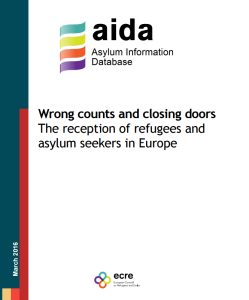see the report HERE
The year 2015 has been marked as a turning point in Europe’s struggle to find adequate responses to the predicament of refugees. The unprecedented number of refugees and migrants arriving irregularly to the continent via the Mediterranean Sea, surpassing one million and the piecemeal, reactive, often irrational response of Member States, led to coining the term “refugee crisis” as currently one of the most critical tests for the European Union (EU) and its broader region. Against this backdrop, one main issue of concern has been the ability – or lack thereof – of states to receive those seeking refuge in appropriate, dignified conditions as mandated by their protection obligations.
The very notion of “reception”, however, is clouded by conceptual uncertainty, which is only exacerbated when states approach the plight of refugees under an emergency-driven mind-set. As far as asylum seekers are concerned, the recast Reception Conditions Directive, the main EU instrument outlining Member States’ obligations in this regard, provides no definition of reception, except for defining “reception conditions” as “the full set of measures that Member States grant to applicants” for international protection.
However, some guidance as to an appropriate understanding of the meaning of reception may be found in the Directive, which provides that “material reception conditions” need to “provide an adequate standard of living for applicants, which guarantees their subsistence and protects their physical and mental health”. The Court of Justice of the European Union (CJEU) has clarified that, as a set of measures apt to guarantee asylum seekers dignified living, subsistence and physical and mental health, reception must therefore be sufficiently stable and adequately satisfy health and other material needs of those undergoing an (often lengthy) asylum procedure.
Situations of emergency or limited preparedness vis-à-vis a large number of arrivals undoubtedly carry wide-ranging administrative and financial consequences for host states. Legal obligations stemming from international law and the EU acquis cannot be read in a vacuum, and are unavoidably qualified by the practical difficulties encountered by European countries.
Yet in the current context European countries and EU institutions have too readily conceptualised reception in quantitative terms, focusing on numbers of places as a benchmark for fulfilling their obligations towards refugees and asylum seekers. This approach runs the risk of sidestepping qualitative aspects at the heart of the concept of reception. Very often, whether in EU policy discourse or in national practice, reception is seen as an all-encompassing net of accommodation measures, which may or may not be designed to ensure asylum seekers an adequate living, able to guarantee their subsistence. Crucial conceptual distinctions between first-line reception, second-line reception, emergency accommodation or even detention, are often absent from both policy and practice, as evidenced in the different findings of this report. These blurred boundaries carry a number of dangers, as they are liable to overestimate the capacity of states to afford proper protection, and to expose asylum seekers to substandard living conditions in countries of refuge.
This Thematic Report tracks these issues by documenting the recent situation of reception of asylum seekers in the 20 AIDA countries, bearing in mind the peculiar legal and policy context applicable in non-EU countries such as Turkey or Serbia, which may merit particular consideration. The information provided in this update combines desk research, with emphasis on the findings of the latest update of AIDA country reports (October-December 2015), as well as input from national experts in the countries concerned.
see the report HERE




